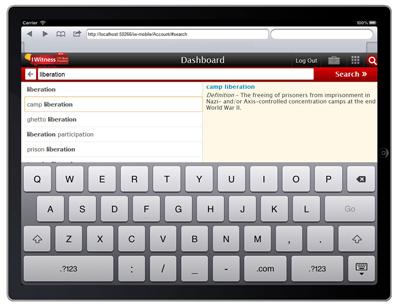"But we shouldn't have an outright ban on deepfakes for satire or freedom of expression. And the growing commercial use of the technology is very promising, such as turning movies into different languages, or creating engaging educational videos," says Professor Sandra Wachter, a senior research fellow in AI at Oxford University. One such educational use of AI-generated videos is at the University of Southern California's Shoah Foundation, which houses more than 55,000 video testimonies from Holocaust survivors.
UCLA IPAM Students Present Results of Information Retrieval Project
Visual History Archive Formatted in HTML5 to Improve User Experience
IWitness Goes Live on iPads and Tablets
IWitness Will Go Live on iPads and Tablets January 6

USC Shoah Foundation is excited to announce the upcoming launch of the tablet-compatible version of its award-winning educational website IWitness.
Technology Staff Develop New Video Restoration Software
Damaged videotapes in the Visual History Archive, previously thought to be unfixable, are being restored thanks to new software developed by USC Shoah Foundation technology staff.
Kigali Genocide Memorial Center Researching Potential for Rwandan Genocide Archive Center
USC Shoah Foundation director of technology Anita Pace is spending the week in Rwanda to work with Kigali Genocide Memorial Center (KGMC) staff on the possibility of building KGMC its own Genocide Archive Center.
The center would be modeled after USC Shoah Foundation’s own Visual History Archive Center, which digitizes, preserves and stores its 52,000 audiovisual testimonies of survivors of the Holocaust and other genocides and provides access to the testimonies to institutions around the world.
Need for Speed: Is your school fast enough for digital learning?
The View from Inside the Classroom: A Teacher Reviews IWitness
Brandon Haas has had opportunities to work with IWitness as a practicing secondary teacher and as a participant in the Master Teacher Program. As a doctoral student of education at the University of South Florida he analyzed various cutting-edge technological tools designed for classroom use and teacher education. IWitness was one of them.
Approaching the Tipping Point: Technology in Education
Pagination
- Page 1
- Next page